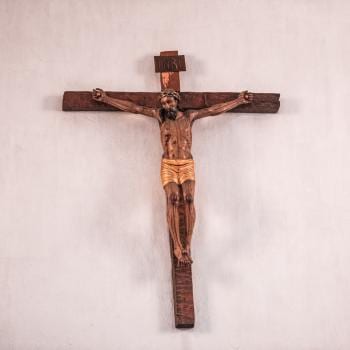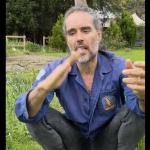The Word, the Light and the Likeness. Each one of them is enough on its own. They are so basic, so essential that it is easy to pass over them and not see them for what they are. Each one of them can be likened to a tether by which we are connected to God. If you let go of it, or pass over it, or discount it, you are going to not understand who Jesus is.
John writes, “In the beginning was the Word, and the Word was with God, and the Word was God.”
One question that a lot of people ask, as they consider religion in general, or Christianity in particular, is “Does God speak?” And if he speaks, can we understand what he is saying? And if we can understand what he is saying, do we have to pay attention to what he has said? I speak. Language is an essential part of my own existence. I’ve tried not speaking for a whole few minutes and found that frustration, anger, and woe followed after me doggedly. When I do speak, misunderstanding, whether accidental or willful, lies close at hand. It isn’t just practically upsetting, to be misunderstood, it can be spiritually and emotionally so. One of my most basic and unquestioned assumptions is the expectation of being understood. I use words in the way that most makes sense to my own mind and when it doesn’t translate easily into the other person, all kinds of unhappiness arises in both parties.
So John sits down with his pen, to write words, and the first thing he writes is, “In the beginning was the Word.” There is some kind of ultimate, primordial Word. John expects we will be able to understand this sentence when he writes it down. Certainly he has in his mind the very first words of the Bible. You don’t write “in the beginning was the word” without first knowing the words, “and God said, ‘let there be light’ and there was light.” The Light is the second essential element, and John will get to it. But first the word ‘said’ is the primary concern. God Said. He Spoke. There was a word that went forth from his mouth and it did not return to him empty. It accomplished that which he purposed, in this case, filling the cosmos with light. The Word, spoken, brought Light by which to see.
But John takes the word, which is just something that comes out of your mouth and floats away and you have to try to keep a hold on it with your mind, but you can’t hold it in your hand, unless it is written on a page, and even then it’s real power is if you say it out loud so that your ear can also hear it, he takes that and says that it is something concrete that is with God all the time. And then he takes it a step further and says that it is God. Not only is it with God, it is God. So we’re not talking about an ‘it’ any more, we’re talking about a ‘him’, a person, a being.
John is showing us not only who God is–he is the Word–but also how God created. Just as Genesis 1 and 2 are the broad view and then the narrow view of creation–what happened in the biggest sense, and then narrowing in to see the particular creation of man–so John 1 is the exalted long view, the working over, the explanation of how that creation occurred. When we want to know how God created, and why, we jump all the way from Genesis to John, from the speaking to the Word spoken, from the light illuminating creation, to the substance of the light Himself.
The Word was in the beginning with God, and all things were made through him. Nothing was made without him. It is pretty frustrating, for the whole world, that none of us were there in the beginning. So we like to be really sure about the thing that we weren’t there to see–the beginning. Science likes to say things with full confidence about the beginning. But really, we can speculate because we weren’t there. There was someone there, the Word, and it was his power, his sustained being that not only brought everything into existence but kept it going. Paul, in Colossians, says it this way, “And he is before all things, and in him all things hold together.” Colossians 1:17
This extends even to me. I don’t hold my own life together, in existence. I am upheld and sustained by the Word. Which, John says, is life.” This is not some sort of esoteric, spiritualist, karmic, vague, metaphorical “life”. It’s not a consumerist modern idea, like “standard of living”. No, we’re talking about actual life. People, and animals, and plants, and anything that breathes in an out–the only way that a single one of us goes on is because in him is life. We live and walk around and eat lunch after church and offend each other and take offense and go to bed and wake up in the morning and try to figure out what to wear and do anything of the things that we do because the Word is Life. That means, he is the life, the way that we continue to live. Not like, my whole life is my family, but rather, I won’t breathe my next breath if the Word doesn’t uphold me and keep me going.
Furthermore, his life was the light of men. So this is the second essential, The Light. And I do love the light. I love being in Sunday School with the youngest children. Every time we read the bible, we light a candle. It’s not magic. It’s a signal to them, and to me, that we are in darkness. We are spiritually blind. All the things that we do, all the decisions that we make are out of a very dark place because we can’t see beyond the single moment that we’re in right now. We are stumbling round in the dark because we don’t know what is going to happen next. We just don’t know. We cannot see.
Not only so, we are also in the darkness of sin. This is a metaphorical way of talking. You can do something wrong in the clear light of day, but what happens to your mind and soul is in no way metaphorical. A blackening death overtakes you every time you violate God’s law. And you can’t not sin. You can’t do the thing you are supposed to do. There is nothing sweater than a little girl on Christmas morning, being given an Elsa costume. She opens up the package, her eyes light up, she lets forth a cry of joy, and your heart warms. And the same moment her little sister, who hasn’t even opened all her packages, lets forth a similar but contrary cry of woe. The heart leaps, suddenly, towards the thing it can’t have. It is involuntary. It is unavoidable. It can’t be kept away from, no matter the human effort. That is the nature of sin, the darkness in which we walk.
So what does the Word, the Light, do? It shines in the darkness. This is extraordinary in its simplicity. As ordinary and necessary as it is to walk into a dark room at night and flip on the light switch, the Light shines in the darkness of the human heart. The Word is there to be spoken, the Light is there to be shown. And what happens when the light shines? Well, the darkness is the one that is pushed back. If the Light once begins to shine in a dark place, it is the darkness that gives way. This physical reality points to the spiritual reality of the soul. The human person sins, the human person is therefore in darkness, the light therefore shines in the darkness, and wins over the darkness. This is a very elegant way of pointing the cross. It will seem, as the story moves forward, that the Light most certainly is overcome by the darkness of human evil. But the moment of greatest darkness, when the sun literally goes out in the middle of the day, will be the greatest triumph of the Light, the overcoming of the darkness.
Which brings us again to the Word. Because the way that the light shines is through the word spoken. If you ever come to verse 6 and wonder why John is suddenly talking about the other John, it isn’t because he suddenly became distracted. It’s because the Light of the primordial Word was about to come into the world, and there had to be announcement of what was about to happen. It is important for us, as we look at the Light, that we not be confused. John is not the light. Any human person speaking about the Light is not the Light. Any lovely illumination that happens as a result of the light being shed is not the light. Any thing that you say or do is only a reflection of the light.
John reiterates it. The true light, not John, not you, not me, was coming into the world. But notice, this true light, gives light to everyone. This we must not miss. Any true and gracious thing that you see anywhere, in anyone’s life, in any corner of creation is because of the true light. If you, in your darkness, have done a good thing, it was because of the true light. None of us can do anything good, just as we couldn’t even be alive, if the light didn’t illuminate the way to do it. And yet, even though the light, which is basically unmistakable–it’s not like you walk outside into the sunshine and gaze up at the clear blue sky and say, wow, would you look how dark it is–came into the world and yet the world did not know him. And, to make matters worse, he came to the people who had not only had the light, but who had had the Word, explicitly, and they did not even recognize him.
Which brings us to the third essential element, the Likeness. The way that the Light shines out is through the Word spoken, so the purpose of the Light is so that you can recognize what is in front of you, the Likeness, the image of God. See how John pivots. God had particularly spoken to some people he made, the people of Israel. He used actual words to break into their darkness and shine his light, not just in the usual, gracious, material sense with which he illumines all of creation with his glory. He spoke particularly. He said who he was and how to know him, how to recognize him for his own self. And for the ones who truly recognized, who believed, he gave the right to be called children of God. These were given a special kind of life. They wouldn’t just be sustained in the ordinary way of not dying for the particular time God allotted to them on this earth, these would be given life forever. They would be born of God.
Nevertheless, Israel had a particular kind of language problem. Israel would use the word YWH, God, they would rightly articulate who God is in the correct language with which he revealed himself, but they would take an object, say a calf made out of gold, and they would use all that language for the calf. So Aaron, in the wilderness, talking to the people about the calf they’ve just made, says, here are your gods, small g, that brought you up out of Egypt. Did some small gods get them out of Egypt? And then he goes a step further into corruption, “When Aaron saw this, he built an altar before it. And Aaron made a proclamation and said, “Tomorrow shall be a feast to the LORD.” The Lord? YWH? He went ahead and said it out loud, with words.
We look at God, we recognize who he is, and then we take his own language and apply it to ourselves. We make ourself into god. And then we take who we are, and we project that onto God. We make an ugly and corrupting exchange. We look at ourselves and decide that God must be like us. We lie and decide that God must be lying. We don’t know ourselves and decide that God cannot be known. We murder, and accuse God of unjustly killing. We turn in on ourselves and decide that God’s love is insufficient, ungracious, unjust, unfair, because we have measured himself against our own darkness and not been willing to understand his light.
What a great mercy, then, what a glorious salvation that the first Word of creation joined itself to our image to be the redemption of the world. God gave us his image, which we destroyed, and so Jesus came to take our image and restore it. He bore our corruption and sin, in himself. The very Word became flesh. God joins the very wordy essence of who he is to humanity so that they are inextricably linked.
Which wasn’t an afterthought. Way back in the beginning, when he said to himself, let us make man in our image, in our likeness, what he was talking about? Part of it had to be the language. He would speak to humanity, and we would understand and respond. And this communicative language bond would be so essential, so intimately part of the picture that God would ultimately call himself The Word.
And the Word, then, would be made flesh, would be a person, someone we could both see and hear, Jesus. His body grew, just like ours, in the body of a woman. He lived an ordinary life, a meager life, a dusty and difficult life. He spoke with his mouth, and people heard him. And he died. His body broke, like ours.
The mark of faith, of rebirth, of being spiritually alive is not that you agree that there’s a God and you do your best to be a reasonably good person, it’s that you listen to and hear the very words of God. That his spoken word sinks deep into the darkness of your soul and remakes you back into the image of the Word. The corrupting idolatry is slowly reversed and you return to the sane image of God’s first creation. You begin to take God at his Word. You read it and hear it and see him. All your own words are transformed to reflect the glory of his Perfect Word.
















